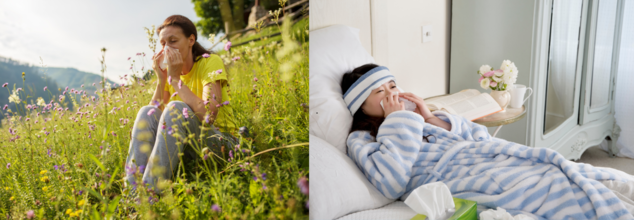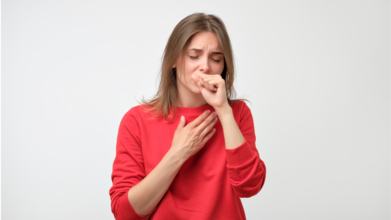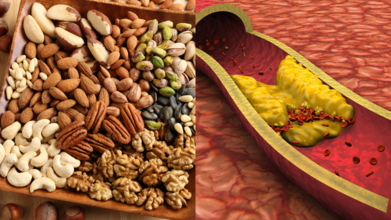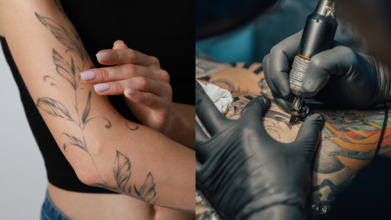- Health Conditions A-Z
- Health & Wellness
- Nutrition
- Fitness
- Health News
- Ayurveda
- Videos
- Medicine A-Z
- Parenting
- Web Stories
How To Know If You Have A Cold Or A Pollen Allergy?

Credits: Canva
Spring is a beautiful time, but it often brings along runny noses, sneezing, and congestion. These symptoms can easily be mistaken for either a cold or seasonal allergies. Both share overlapping traits, but they stem from entirely different causes. A cold is caused by a virus, making it infectious, while seasonal allergies are your immune system’s reaction to harmless substances like pollen.
In many parts of the world, it is also the time when seasonal changes are occurring. With shorter springs, longer summers, or the transition in between, pollen is everywhere. However, it does not mean that other common virus and bacteria are gone. So, how do you differentiate between them, especially when you get sick? How do you know when you have a cold or an allergy.
Let us check this out!
What Are Seasonal Allergies?
Seasonal allergies, also known as hay fever or allergic rhinitis, happen when your immune system mistakenly sees pollen as a threat and releases chemicals like histamines to fight it. This overreaction leads to sneezing, a runny or stuffy nose, itchy eyes, and sometimes throat irritation.
Different types of pollen trigger allergies depending on the season. In spring, tree pollen is the main culprit. As the year progresses, grass and weed pollens take over. Due to rising global temperatures, allergy seasons are starting earlier and lasting longer than before.
What Is a Cold?
A cold is typically caused by viruses like the rhinovirus and is more common during seasonal transitions. It spreads easily through the air or by touching contaminated surfaces. Cold symptoms often include a sore throat, fatigue, congestion, sneezing, and a runny nose. You may also experience body aches and a mild fever.
Unlike allergies, which persist for weeks or even months, colds usually last between three and seven days for most healthy individuals.
Key Differences Between a Cold and Allergies
Despite their similarities, colds and allergies have a few clear distinctions:
Duration: A cold is short-lived, usually resolving within a week. Allergies persist throughout the pollen season.
Itchiness: Allergies commonly cause itchy eyes and throat. Colds may bring soreness but rarely itchiness.
Fever and Body Aches: Colds can come with mild fever and aches. Allergies do not.
Contagiousness: Colds are infectious; allergies are not. If you’re sneezing and spreading droplets, you could pass on a cold.
Mucus Color: Colds may lead to yellow or green mucus. Allergy mucus tends to stay clear.
Treating Seasonal Allergies
To manage allergy symptoms:
- Use saline nasal rinses to clear allergens.
- Apply anti-itch eye drops for relief.
- Take over-the-counter antihistamines or corticosteroid nasal sprays.
- Track local pollen levels and avoid high-pollen days.
- If symptoms persist despite self-care, consult a healthcare provider.
Treating a Cold
There’s no quick fix for a cold, but you can ease symptoms by:
- Getting plenty of rest.
- Drinking fluids to stay hydrated.
- Avoiding contact with others to prevent spreading the virus.
- Recovery usually comes with time and supportive care.
What Is Pulmonary Fibrosis and Why That Annoying Cough Might Be More Than Just a Cold

Credits: Canva
If you’ve been coughing for weeks, blaming it on “lingering winter sniffles” or chalking it up to “just getting older,” it might be time to step away from the cough syrup and lean in for some uncomfortable truth. Your cough could be more than a seasonal annoyance. In rare but serious cases, it could be a red flag for a life-limiting condition called pulmonary fibrosis.
What is Pulmonary Fibrosis?
In plain terms, “pulmonary” means lungs, and “fibrosis” means scarring. It’s a serious, progressive condition where lung tissue becomes scarred and stiff, making it increasingly hard to breathe.
Reportedly, there’s currently no cure. Treatments exist, but they mainly slow down the damage rather than reverse it. The sooner you get diagnosed, the better your chances of managing symptoms and that’s where spotting the signs early is crucial.
Symptoms to Watch For
- Shortness of breath (especially when climbing stairs or speed-walking to catch the bus)
Why That Cough Happens
Coughing is your body’s bouncer, booting out anything that might harm your lungs — dust, smoke, rogue crumbs, the works. The process involves your vocal cords clamping shut, then snapping open with a burst of air.
With pulmonary fibrosis, this reflex can get stuck on a loop. Coughing irritates the vocal cords, which makes you cough more, which irritates them further, a vicious cycle that can turn even a quiet cup of tea into a coughing fit.
The Four Flavours of Cough
- Acute cough – Lasts less than three weeks; often tied to infections or irritants.
Coughs can also be:
- Dry/unproductive – Triggered by things like temperature changes, dusty air, or laughing.
Who’s More at Risk?
While pulmonary fibrosis can happen to anyone, your risk might be higher if you:
- Are over 50
Managing the Cough
A pulmonary fibrosis cough often doesn’t respond to standard cough medicines. Instead, treatment usually focuses on easing symptoms and improving quality of life.
Your doc may recommend alternative medications used for chronic cough in other conditions. These don’t cure the scarring but can make the coughing less intrusive. They’ll also want to check for other contributing factors like acid reflux, sinus issues, or side effects from medication, because if those are making things worse, tackling them can help.
Everyday Coping Tricks
While you work with your doctor, you can try a few lifestyle tweaks to manage coughing fits:
- Avoid smoky, dusty, or heavily polluted spaces
Pulmonary fibrosis is rare, but catching it early can mean more treatment options and better management. Plus, you’ll finally know whether your cough is from a stubborn cold or something that needs closer attention. Your cough could be a harmless side effect of a dusty ceiling fan or it could be your body waving a red flag.
Scientist Reveals the Tiny Foods That Can Transform Your Cholesterol in Just 10 Days

If you’ve ever stared at a packet of mixed nuts wondering whether to sprinkle them over your porridge or just eat them by the handful, here’s your permission slip: go for it. According to Dr Sarah Berry, a professor at King’s College London and Chief Scientist at ZOE, nuts and seeds are not just snackable; they are good for cholesterol crunching. In fact, swap some of your less healthy fats for these nutritional powerhouses, and you could lower your cholesterol by up to 10 per cent in just 10 days. That is faster than most fad diets.
The 10-Day Cholesterol Challenge
High cholesterol often feels like one of those invisible problems, until it suddenly is not. It can quietly build up in your arteries, increasing the risk of heart attacks and strokes. But Dr Berry, during an appearance on the Zoe podcast, said that you can make a real difference in under two weeks by tweaking, not overhauling, your diet. It’s not about eating less fat; it’s about eating the right kind of fat.
And this is where most people get it wrong. “Don’t do a low-fat diet,” Dr Berry warns, calling the idea “radical” to anyone still following decades-old advice. Instead, aim for a moderate-fat diet rich in polyunsaturated and monounsaturated fats—exactly the kinds you’ll find in nuts, seeds, and certain oils.
Why Low-Fat Diets Miss the Point
It is tempting to think cutting fat will cut cholesterol, but Dr Berry explains that’s a trap. Not all fats are bad. Saturated fats, found in red meat and some processed foods, can push LDL cholesterol—often dubbed “bad” cholesterol—into dangerous territory. But polyunsaturated fats, abundant in seeds, seed oils, and many nuts, do the opposite.
Simply adding nuts to your meals, whether as a snack, salad topping, or nut butter, can slash LDL cholesterol by 5 to 10 per cent. You have to make a swap. This benefit comes from replacing “harmful” fats, like those in certain animal products and fried foods, with healthier plant-based fats.
Seeds: The Cholesterol Fighters
Sunflower seeds, flaxseeds, chia seeds—they’re all loaded with polyunsaturated fatty acids that support heart health. Stir them into yoghurt, blend them into smoothies, or scatter them over roasted veggies. You’ll barely notice the extra effort, but your arteries will thank you.
Seed oils, like sunflower and flaxseed oil, can also be smart choices in moderation, adding healthy fats to your cooking without the cholesterol-raising impact of certain animal fats.
Rethinking Dairy, Meat, and Carbs
Dr Berry isn’t out to demonise all animal products. Fermented dairy like yoghurt and cheese gets a surprising green light. These foods, she says, don’t have the cholesterol-raising effect you might expect from their saturated fat content. That’s not permission to live on brie and cheddar, but it is a reason to stop fearing your cheese board.
Red meat, however, is a different story. Packed with saturated fats, it’s a direct contributor to rising cholesterol levels. Swapping steak nights for lentil stews or chickpea curries a couple of times a week could make a noticeable difference to your numbers.
Then there’s the carbohydrate conundrum. The real trouble lies with refined carbs like white bread, white rice, and sugary snacks. These are rapidly processed by your body and can be converted into triglycerides, which worsen cholesterol profiles. But whole grains are firmly in the “good for you” column. Wholegrain bread, brown rice, oats, and quinoa can help improve cholesterol levels when they replace the refined stuff.
Building Your 10-Day Cholesterol Menu
Swap your morning white toast for porridge topped with walnuts and chia seeds. Your mid-morning biscuit could become a small handful of almonds. At lunch, toss sunflower seeds into your salad, and use olive or sunflower oil for dressing. Dinner might feature grilled salmon or chickpeas instead of steak, with a side of quinoa instead of white rice.
Why This Works So Fast
Cholesterol levels can be surprisingly responsive to dietary changes. LDL cholesterol particles are constantly being produced and cleared from your bloodstream. When you replace saturated fats with healthier fats, you improve your body’s ability to remove LDL cholesterol. Combine that with reducing refined carbs and upping your wholegrain intake, and the improvement can be measurable in just days.
Dr Berry’s advice is refreshingly realistic: no calorie counting, no extreme restrictions, just sensible swaps. It’s about building habits you can maintain beyond the initial 10 days, keeping your cholesterol low for the long haul.
Forget the idea that lowering cholesterol means bland food and joyless salads. With nuts, seeds, and the right fats, you can eat deliciously and still give your heart a health boost in record time.
Why Your Tattoo Looks 'Cloudy' During Healing: Experts Demystify Recovery Process

You walk out of the tattoo studio with fresh ink that looks bold, bright, and perfect. But within a few days, you notice the colours seem duller, almost blurred. Do not worry! This cloudy look is a normal part of healing. According to dermatologists and tattoo artists, that milky veil over your design is not the end of your tattoo dreams. It is simply your skin doing its job.
The Science of the Skin Screen
As Dr Pragati Gogia Jain, DNB (Dermatology) at ApolloMedics Hospital, Lucknow, explains, our skin has layers. The top layer, called the epidermis, is made up of keratinocytes. When these cells are young, they’re packed with organelles and nuclei, making them opaque. As they mature, they lose these structures, becoming more transparent.
When you get a tattoo, the needle bypasses the epidermis and deposits pigment in the dermis. This process causes a controlled injury, triggering inflammation. In the days that follow, damaged keratinocytes in the epidermis start shedding (desquamation), and the fresh replacements are immature and cloudy.
“This cloudy layer scatters light, making the tattoo look dull,” says Dr Jain. “It’s temporary, and as the epidermis completes its 28-day turnover cycle, your tattoo will regain its clarity.”
What’s Happening Beneath the Tattoo Ink
Sahil Bali, tattoo artist at Devil’z Tattooz, says the fresh-out-of-the-studio vibrancy is like an Instagram filter: beautiful, but fleeting. “Right after we finish, the ink is just beneath intact skin, so the colours look sharp,” he says. “But as your immune system gets to work, a thin layer of scabbing or peeling skin forms. It’s made of dried plasma, old skin flakes, and natural oils, which aren’t transparent.”
This layer dulls the appearance of the tattoo. From day four to day ten, peeling starts. The temptation to pick at those flakes is real, but doing so can yank out pigment and cause patchy healing. “Hands off is the golden rule,” warns Bali.
Why Tattoo Aftercare Matters
While most cloudiness is part of the healing process, poor aftercare can make it worse. Dr Jain says that slathering on too much ointment can trap moisture between skin layers, creating a hazy effect. Over-moisturising can also make the peeling phase messy, while under-moisturising can slow healing.
The golden trio of aftercare:
- Keep it clean, but not soaking wet
- Moisturise lightly with fragrance-free ointment or lotion
- Avoid scratching, picking, or exfoliating the area until it’s fully healed
The Healing Timeline: What to Expect
- Week 1: Swelling and inflammation can make colours look slightly different. Cloudiness starts to creep in.
- Week 2: Peeling is in full swing, and the haze is most noticeable. Do not pick.
- Weeks 3–4: New skin settles in, clarity returns, and your tattoo looks almost like day one.
- Weeks 4–6: Full healing. Your tattoo now has its true colours and crisp lines.
Your tattoo’s journey is a cycle: vibrant due to fresh ink, hazy during inflammation and peeling, then clear again as the skin regenerates. In short:
- The cloudy phase is temporary.
- Don’t touch, scratch, or peel.
- Follow optimal aftercare to prevent infection.
- Always ensure your artist uses fresh, sterilised needles.
As Bali puts it, “Your tattoo is for life. A couple of hazy weeks is nothing compared to years of wearing a clear, beautiful design.”
© 2024 Bennett, Coleman & Company Limited

